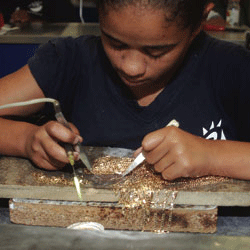|
News
Articles from INDUSTRY ASSOCIATIONS (263 Articles), GEMSTONES - LOOSE (254 Articles), PRECIOUS METAL SERVICES (26 Articles)

An African worker assembling jewellery. Luxury jewellery brands are lagging behind smaller brands in the ethical sourcing of metals and gemstones
Luxury jewellery brands fail to address ethical responsibilities
 71.0 k views | Posted July 26, 2011 71.0 k views | Posted July 26, 2011 | By Sonia Nair
Luxury jewellery brands are lagging behind smaller brands in the ethical sourcing of metals and gemstones, according to an independent report by non-profit organisation Fair Jewelry Action and strategic adviser, Lifeworth Consulting.
Entitled Uplifting the Earth: The Ethical Performance of Luxury Jewellery Brands, the report surveyed ten brands and compared their performance with innovations in the ethical sourcing of precious metals and gemstones. The report claims to be the world’s first benchmark in ethical performance of the luxury jewellery sector.
The ten brands surveyed were Bulgari, Cartier, Chanel, Chopard, Graff Diamonds, Harry Winston, Piaget, Van Cleef & Arpels, Boucheron and Buccellati.
According to the report, luxury jewellery brands apart from Cartier and Boucheron, have been slow to endorse responsible business practices. It also claims there is a general lack of transparency on social and environmental performance amongst luxury brands – despite the fact that many of them are members of the Responsible Jewellery Council (RJC).
The report found that six of the ten brands still sold Burmese rubies from their stores in London and Geneva last year, despite an EU embargo.
It also states that the gap in the market for ethically responsible jewellery is providing opportunities for new brands to emerge. The report concluded that a reason for the lack of comprehensive action from luxury brands is the fact that they do not have a positive vision for the jewellery industry’s ethical role.
The report’s co-author Dr. Jem Bendell said, “Although a decade of effort to reduce conflict and environmental damage from jewellery supply chains has curbed some of the worst practices, it has failed to identity an aspirational role for jewellery.”
A majority of the brands surveyed in the report are members of the RJC with the exception of Chopard, Graff Diamonds and Buccellati. RJC chief executive Michael Rae said the report was “profoundly underwhelming and one-sided”.
“The report fails to acknowledge the complexities of the issue of [ethical responsibility] and the genuine efforts taken by many of the brands to address it,” Rae said.
“The study looks at the right things such as the fact that the companies should be looking at labour conditions but that is stating the obvious. How should companies go about it? That’s where the RJC comes in. This study is simplistic in its view,” Rae added.
Rae said the luxury jewellery brands represented by the RJC are working through the RJC and a raft of non-governmental organisations to track and trace materials used in their product.
Importance of ethical responsibility in a business modelThis report coincides with the finding that luxury consumer attitudes are evolving when it comes to their expectations on the ethical, social and environmental responsibilities of luxury brands.
A 2010 study by market research Ifop showed that 47 per cent of individuals in the top 25 per cent income bracket across France, China, Japan and the US are willing to pay more for responsibly produced goods – a statistic that intensifies the need for jewellery brands to concentrate on social issues to engage with average consumers.
Co-founder of Fair Jewelry Action Marc Choyt said it is vital jewellery brands incorporate ethical considerations into their business model. “The big brands must get their act together if they are not going to lose customers to the companies that really care. They can’t hide behind vague statements of the Kimberley Process anymore, because others are showing what’s possible.”
“We can make jewellery that makes a positive difference to the world,” Choyt added.
The World Jewellery Confederation (CIBJO) also released a report last year that urged luxury jewellers to respond to an emerging social conscientiousness among consumers to secure commercial success.
More reading:
'Conscientious' jewellery consumption on the rise
World Gold Council drafts 'conflict-free' gold scheme
Charity partnerships good for jewellers
Luxury jewellers must appeal to consumers' conscience
|
|
Search for Industry Associations
|
|